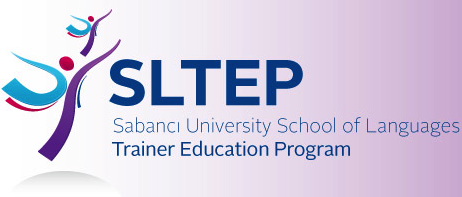 School of Languages Trainer Education Program (SLTEP)
School of Languages Trainer Education Program (SLTEP)
SLTEP is designed to provide professional development in the area of language teacher education. It aims to help participants develop the knowledge, skills and awareness required for effective teacher training with a view to catering for the training and development needs of teachers in their own institutions and in a wider training context.
Trainer training is an area where there is a growing and challenging demand for formal and informal training at pre- and in-service levels. Even if they may not be called ‘trainers’ as such, more and more professionals in the field today are getting involved in teacher training and development activities in their own contexts and elsewhere as senior teachers, mentors, heads of departments, school directors, etc. However, not many professionals have the opportunity to train as teacher trainers; whether in their goals towards becoming a ‘trainer’ officially or for systematic involvement in a variety of professional development and training activities such as presentations/workshops, observations etc. Some are invited to become teacher trainers because they are highly effective as teachers and work well with their peers, always ready and happy to share with and support others; some are so interested in teacher training that they make use of every opportunity that may arise both in their own contexts and elsewhere e.g. by attending workshops, teacher training courses and conferences, by offering several workshops themselves and eventually getting (more) involved in training; others find themselves thrown into teacher training because they have many years of teaching experience and are believed to be the right people for the ‘job’, etc. Whatever the starting point may be, the biggest challenge for any colleague involved in teacher training, including those who may even have received some formal training, is the need to continue to invest in their own personal and professional development.
Among the many challenges we face in the area of teacher training today, is the need to move away from an either-or mindset and a doers-doees dichotomy. Training and development are not either-or concepts as they are often, and most unfortunately, presented and discussed in many forums where lists and tables are drawn up, comparing and contrasting features of training and development, putting forward arguments for, e.g. why development is better, what training does or does not do to you. Trainer discourse also reveals that trainers continue to be concerned with changing teachers, changing behaviour, and changing beliefs as can be observed in the following sample extracts from a number of recent presentations at international conferences:
• “I cannot say that I have changed the attitude of all teachers.”
• “It’s difficult to get rid of their beliefs.”
• “This [research] was an attempt to change teaching behaviour which will hopefully change their beliefs.”
 This is where the need for effective trainer training becomes so crucial; to help raise and enrich trainer awareness that teacher training and development go hand in hand and that training should not set out to change others or “to get rid of their beliefs”, but to support others and self in their personal and professional development.
This is where the need for effective trainer training becomes so crucial; to help raise and enrich trainer awareness that teacher training and development go hand in hand and that training should not set out to change others or “to get rid of their beliefs”, but to support others and self in their personal and professional development.
Be it through observations, courses, sessions, workshops, tutorials and the like, any training activity should be based on the idea of development in teacher learning, respecting teachers’ existing knowledge, experience, and teaching styles; exploring their beliefs about teaching and learning; encouraging principled and systematic reflection; raising teachers’ awareness of effective teaching; and promoting the idea of mutual learning in the trainer-teacher relationship. For training effectiveness, we need to systematically explore our ‘selves’ and critically reflect on our own approaches and practices as trainers. Most importantly, we need to build greater receptivity to ourselves and towards others; respect teachers and their contexts; and become aware of how training can in fact interfere with teachers’ vast potential and development unless we adopt a supportive, involving and collaborative approach. We need to keep challenging our own thinking as trainers and create similar opportunities for our selves and for teacher and trainer trainees, engaging them and with them, in thinking and in research-focused tasks and processes. This is how we, as trainers, can grow to hear and see beyond the moment in a world where we exist alone together in our personal and professional development.*
Dr. Deniz Kurtoğlu Eken, SLTEP Program Director
* Kurtoglu Eken (2010) Principles and practice in trainer training and supervision In IATEFL Teacher Training and Education SIG NL
Please click here for the SLTEP website.
